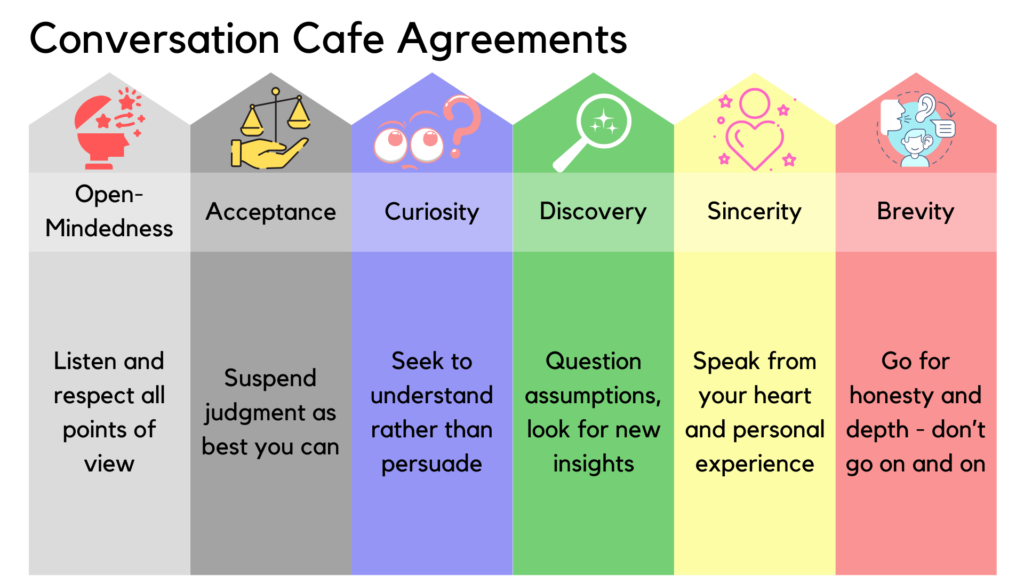By Susan Dunlop — Founder of Blue Borage, creator of the Conversation Café, Advisory Board Member at 5WAVES, and champion of the memoir-guide Resolve by Alice Perle
One of the comments I hear most often in my work is: “It must be hard to keep hearing everyone’s stories.” I understand where this comes from — but as my husband pointed out to a friend recently, that question often reveals more about the listener’s lens than mine.
Choosing what to hear, and what to share
I do not ask people to recount the details of their abuse. I don’t appreciate people who ‘over-share message bomb’ me with graphic details in my Instagram inbox, email inbox or Messenger. Educating people on boundaries is part of the role of an advocate and we model this in how we guide the Conversation Cafe events as well.
Part of our housekeeping at each event includes the six Conversation Cafe Agreements.
These are shared to the screen, read and everyone is asked to acknowledge them with “yes” or “agreed” in the chat before we proceed into the conversation itself. Always, those conversations are powerful, empowering, even lifechanging because of the compassion and vulnerability these Agreements bring to the space we share.

Even in my own therapy, that I finally walked towards in my 50s, my psychologist made it clear: unless the details help the healing, I am not obliged to speak them aloud. That blew and then eased my mind!
Before arriving and finding my seat on our red lounge on that first day of therapy, I pictured that she would be drilling me with tough questions. I was scared ‘what if I didn’t know the right answers, what if I made it all up’. Something as simple as that ‘myth’ of therapy I was carrying, to be honest, was part of why I delayed seeking out the therapy I finally did get in my 50s.
All through the earlier decades between the time the abuse ended and real therapy began, I was scared that therapy might have me crack open at the seams! I was busy, a mum, a business owner, I didn’t have time for that. What if I couldn’t pull back on my social masks quickly… or at all? What then?
This therapist created a space where I felt safe, and continued to show up, longer than I expected, but for as long as I needed. It takes time to recover and unpack the complexity of SSTA.
She also shared that she had facilitated group sessions for survivors before.
Those survivors didn’t enter with an expectation to “tell their story” in its rawest form. Instead, they’d choose a card on arrival — maybe a flower, the ocean, or something else symbolic — to express how they were feeling that day.
The conversation would then be guided toward what was possible, what was helping, what was next. Her ground rules were simple but vital:
- The space was for healing, not for digging around in the worst moments.
- Be conscious of the people gathering here for connection and community.
- No one “deserves” to hear the graphic details — and not everyone could, or should, hear them today, tomorrow, or ever.
The danger of oversharing
I’ve seen, especially in the space of child sexual abuse advocacy, how some overshare every single action their parents did to harm them. That to me feels like alarm bells go off in my mind – I see so much risk to children now, due to their over share or sensationalising of their story. Maybe it’s the vigilance in me, or the CEO of a healthcare company I was where I was very conscious of risk, so looked out to see what I needed to see. But when I accidentally land in the space of these public overshares, I see another, less discussed risk: feeding ideas to potential offenders.
A real life example of how sharing can go wrong (a high level share only here)
A psychologist once told me about a young woman who had shared in therapy that her father had abused her. Later, she shared the details of what she had told her psychologist, with her girlfriend, who went home and told her parents. That night, her father, turned-on by the story, did the same thing to her that her friend’s father had done.
It’s a story that stops you in your tracks. Not because it’s rare — but because it’s a stark reminder: details can be misused.
Advocacy with consciousness
This is why I believe in advocacy that is both trauma-informed and context-aware.
We need to ask:
- Who is my audience?
- What do they need to understand?
- What details, if any, will actually advance prevention, support, or justice?
In our Conversation Café events, the focus is on creating a brave space where the narrative is shaped by what can bring change — not by re-enacting harm. We use tools, frameworks, and lived wisdom to build bridges between survivors, families, and professionals.
Stories matter — but in advocacy, how and to whom we tell them matters just as much.
You’ll find the full schedule of the coming Conversation Cafe events through until December 2025 in an earlier blog. Links to the EventBrite page can be found there or on the www.blueborage.com.au/conversation-cafe-and-events page.
